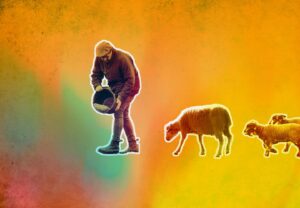Discipleship is a funny word. As Believers, each of us probably have some basic thoughts as to what discipleship means; if asked, however, most of us would describe it in very distinct terms. For me, the concept of discipleship or “making disciples” was something I did not really consider until I was around 27 years old.
Growing up as a Southern Baptist in the 70s and 80s, discipleship was often reduced to curriculum and curriculum was almost always taught within the church. Therefore, discipleship was almost always thought of as 1) church-based, 2) Sunday school driven, and 3) church- program focused. Small groups or individualized discipleship was not a regular practice of the church at a cultural level.
This all changed for me when I was 27. I had started attending Heart of the Springs Church in Colorado Springs. A leader in the College/Career Group named Jason offered to get together and just talk about ideas of Spiritual Gifting. I was interested in this so I said yes, having it in my mind that this would be short term (i.e. “If this gets weird, I’m getting out of this quickly!”). It was relatively short term (a reinforcement that effective Disciplemaking does not have to be perpetual) but it led to additional discipleship relationships and organically led me to begin to disciple others. This “multiplying” aspect was not necessarily taught or emphasized but intuitively made sense to me: just as I was poured into, I wanted to pour into others.
Discipleship at its core really comes back to one main idea: intentionally walking alongside others for the purpose of encouragement, holistic growth, and the discovery of purpose within the Kingdom of God. I like to define the root word of discipleship (disciple) in this way:
“one being drawn by God to progressively lead, learn, and love more like Jesus.”
This idea of remaining progressively “in-motion” is truly the heart behind why discipleship has become so important to my life and ministry. And it returns to my personal discipleship journey: God, in His Sovereignty, worked to move me to expand my imagination of my potential in ministry leadership. But without intentional outside development and influence taking place at a discipleship level, many will flounder (like I did for so long). It is simple: all discipleship within the church setting must extend from a vision to live out the Biblical mandate to “make disciples of all people”.
“Go therefore and make disciples of all nations, baptizing them in the name of the Father and of the Son and of the Holy Spirit, teaching them to observe all that I have commanded you. And behold, I am with you always, to the end of the age.” -Matthew 28:19-20, ESV
This Biblical disciplemaking reality has to be ingrained within the culture of the church. At Redemption Hill, we have been inspired to grab ahold of the opportunity to redirect our energy and efforts to truly reflect our Value of Discipleship. With that, one of the questions that is often asked in connection to this value is this:
How Can We Know When We Have Truly Made a Disciple/Disciplemaker?
The answer, at its most simple but not simplistic level, is that the growing disciple begins to produce fruit; individuals begin to have a heart of Disciplemaking as well as a heart for reproduction and multiplication. That Disciplemaking character begins to include a growing passion to see the lost know Jesus, a willingness to naturally engage lost people or those with questions about Jesus, an overtly displayed healthy understanding of ideas of growth and development, and an ability to cast vision for Disciplemaking based upon what they have been taught through the discipleship process.
“You will recognize them by their fruits. Are grapes gathered from thornbushes, or figs from thistles? So, every healthy tree bears good fruit, but the diseased tree bears bad fruit. A healthy tree cannot bear bad fruit, nor can a diseased tree bear good fruit. Every tree that does not bear good fruit is cut down and thrown into the fire. Thus, you will recognize them by their fruits.” – Matthew 7:16-20
For the church today, we have to think about what discipleship should look like in our context. As we move forward into a rapidly expanding post-Christian culture, how can we invite people into our shared value of Discipleship? In doing so, what are some essential elements of a lifelong Disciplemaking path? I believe there are many directions or pathways that we could take, but I will simply offer a few ideas:
#1
The first is direction. We must seek to discover where people might want to go on their Disciplemaking pathway? With that, because this is about multiplication, we need to ask, where do you want to take others? The path has to lead somewhere and we need to remember where we are hoping to take people.
#2
The second idea is continually reemphasizing the vision. Without consistent reemphasis of the vision (the direction and the purpose of discipleship), people will lose track of the “why” behind the actions.
#3
The third idea is holding on to simplicity. The “what” of a discipleship pathway is grounded in teaching, training, and exhorting. It is easy to get bogged down in the minutiae of details that are important but not always immediately necessary. Again, we have to keep things simple without drifting into the simplistic. We will utilize discipleship material that stretches minds, hearts, and actions without forgetting the simplicity of the Gospel.
#4
Fourth, vetting participants is necessary. Without proper vetting, (e.g. accountability, defined expectations, consistent attendance, etc.), you could have individuals, not yet ready for a discipleship commitment, join the pathway. The discipleship pathway should be available to everyone who will commit to the process and to continuing to grow, learn, and model what they are learning to those around them. Those who join the pathway should remain teachable, humble, and be willing to do the hard work of growing, learning, and expressing what has been learned.
#5
Lastly, maintain a commitment to a primary objective. We need to know where we are taking people. Before beginning the pathway with participants, we must document a metric of how we will know if people have made progress. What should be an observable result in the people who progress through our discipleship pathway? At the end of a section of the discipleship pathway, we must process with participants both individually and/or as a group. As Kevin Leman stated in his book, The Way of the Shepherd, we have to know our sheep, appropriately gauge their progress, and have ideas for ways that they can move forward in learning as well as applying what they have learned within a ministry context.
Church, everyone is a disciple of something—everyone is a learner or an apprentice of something. Each of us finds value in what we pursue or we would not pursue it. This could be wealth, fame, relationships, a hobby; truly, every person on earth is devoted to something that they see as worth learning about and devoting energy to in order to master.
The pursuit of Jesus is not different except that in the pursuit of Him we find perspective-altering humility and the realization that serving Holy Jesus, as well as other people, is more important than serving ourselves.
True discipleship is about a transformation of the heart!
If not careful, as a church we have the ability to do so much for Jesus without ever becoming more like Jesus. We hold the dubious potential of “working for Jesus” without ever becoming more humble, more loving, or more sacrificial. True Discipleship is being willing to die to ourselves for the sake of the Gospel…for the sake of others…because internally we know Jesus is worth it.
Colorado Baptists, let us never, ever forget: Jesus is worth it.
Al Barrera is the co-pastor of Redemption Hill Church in Colorado Springs.





